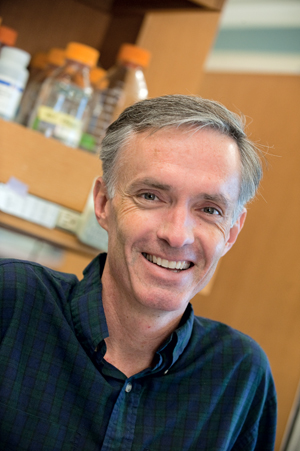James Collins Wins Lagrange Prize
Award recognizes work that’s, well, complex

Many of us try to simplify our lives. James J. Collins revels in complexity, and it’s a good thing, too.
Collins’ research into what’s called complexity science has spurred new devices to treat stroke-induced brain failure, enhanced doctors’ understanding of how human posture is warped by aging and Parkinson’s disease, and helped invent synthetic gene networks, whose many uses include fighting bacterial infections. Most recently, Collins’ dexterity with complexity earned the William Fairfield Warren Distinguished Professor and College of Engineering professor of biomedical engineering the 2010 Lagrange-CRT Foundation Prize.
The prize, given by the Institute for Scientific Interchange Foundation (ISI) in Turin, Italy, honors “outstanding contributions relevant to the progress of complexity science.”
Complexity science refers to the multidisciplinary study of complex systems, which can range from the cell to the ecosystem to the stock market to ant colonies.
“Collins’ path-blazing work on complex systems in biology is changing our world for the better, and improving the lives of others,” President Robert A. Brown wrote in his nomination letter for the award, bestowed by a scientific commission of the ISI. Collins, who codirects the University’s Center for BioDynamics, will receive a prize of 50,000 euros, or more than $60,000.
“This is a big deal,” says Provost David Campbell. “It puts Jim into a very elite group” of winners, among them Princeton mathematician Yakov Sinai, who pioneered measurements of dynamical systems (systems that change over time), economist W. Brian Arthur, who advanced the concept of increasing returns, and Italian physicist Giorgio Parisi.
“I am honored and humbled to receive the Lagrange Prize, particularly in light of the stellar achievements of the previous recipients,” says Collins. “I have benefited tremendously from the strong support shown by the BU community for interdisciplinary complexity research,” which he says predates the field’s uptick in popularity among scientists.
Terminator fans would also appreciate Collins’ work. Early in his BU career, he studied the dynamics of locomotion control and animal gaits. Roboticists glommed onto his discoveries to devise simplified control networks for legged robots.
Collins won a MacArthur Fellowship (the popularly dubbed “Genius Award”) in 2003. Two years later, Scientific American named him one of the 50 top leaders in science and technology. In 2008 he became BU’s first Howard Hughes Medical Institute investigator, a position he holds concurrently with his BU appointment. He received the University’s highest teaching honor, the Metcalf Cup and Prize, in 2000. He earned a B.A. from the College of the Holy Cross and a Ph.D. from Oxford University.
Rich Barlow may be reached at barlowr@bu.edu.
Comments & Discussion
Boston University moderates comments to facilitate an informed, substantive, civil conversation. Abusive, profane, self-promotional, misleading, incoherent or off-topic comments will be rejected. Moderators are staffed during regular business hours (EST) and can only accept comments written in English. Statistics or facts must include a citation or a link to the citation.